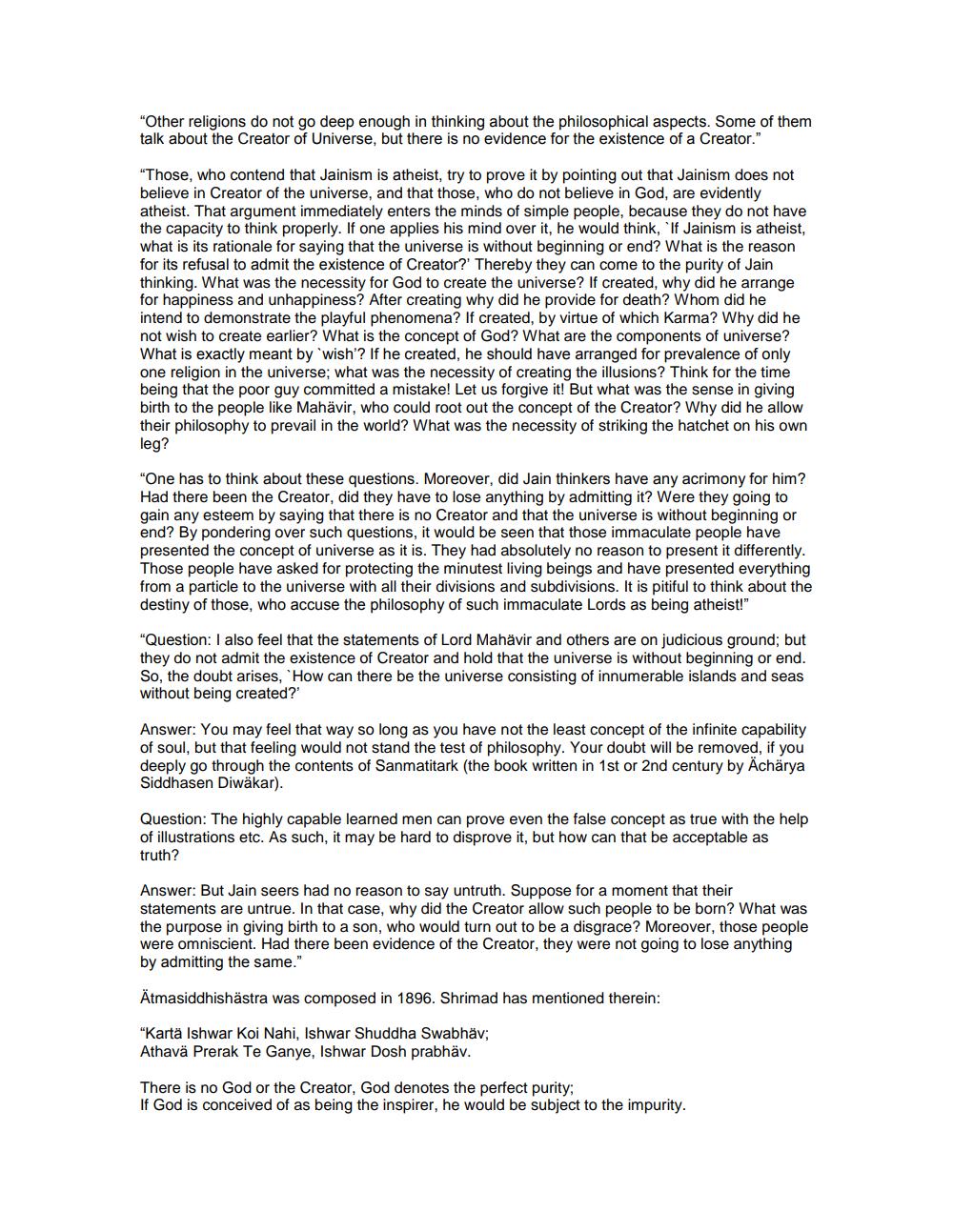________________
"Other religions do not go deep enough in thinking about the philosophical aspects. Some of them talk about the Creator of Universe, but there is no evidence for the existence of a Creator."
"Those, who contend that Jainism is atheist, try to prove it by pointing out that Jainism does not believe in Creator of the universe, and that those, who do not believe in God, are evidently atheist. That argument immediately enters the minds of simple people, because they do not have the capacity to think properly. If one applies his mind over it, he would think, 'If Jainism is atheist, what is its rationale for saying that the universe is without beginning or end? What is the reason for its refusal to admit the existence of Creator?' Thereby they can come to the purity of Jain thinking. What was the necessity for God to create the universe? If created, why did he arrange for happiness and unhappiness? After creating why did he provide for death? Whom did he intend to demonstrate the playful phenomena? If created, by virtue of which Karma? Why did he not wish to create earlier? What is the concept of God? What are the components of universe? What is exactly meant by wish? If he created, he should have arranged for prevalence of only one religion in the universe; what was the necessity of creating the illusions? Think for the time being that the poor guy committed a mistake! Let us forgive it! But what was the sense in giving birth to the people like Mahävir, who could root out the concept of the Creator? Why did he allow their philosophy to prevail in the world? What was the necessity of striking the hatchet on his own leg?
"One has to think about these questions. Moreover, did Jain thinkers have any acrimony for him? Had there been the Creator, did they have to lose anything by admitting it? Were they going to gain any esteem by saying that there is no Creator and that the universe is without beginning or end? By pondering over such questions, it would be seen that those immaculate people have presented the concept of universe as it is. They had absolutely no reason to present it differently. Those people have asked for protecting the minutest living beings and have presented everything from a particle to the universe with all their divisions and subdivisions. It is pitiful to think about the destiny of those, who accuse the philosophy of such immaculate Lords as being atheist!"
"Question: I also feel that the statements of Lord Mahävir and others are on judicious ground; but they do not admit the existence of Creator and hold that the universe is without beginning or end. So, the doubt arises, 'How can there be the universe consisting of innumerable islands and seas without being created?
Answer: You may feel that way so long as you have not the least concept of the infinite capability of soul, but that feeling would not stand the test of philosophy. Your doubt will be removed, if you deeply go through the contents of Sanmatitark (the book written in 1st or 2nd century by Acharya Siddhasen Diwäkar).
Question: The highly capable learned men can prove even the false concept as true with the help of illustrations etc. As such, it may be hard to disprove it, but how can that be acceptable as truth?
Answer: But Jain seers had no reason to say untruth. Suppose for a moment that their statements are untrue. In that case, why did the Creator allow such people to be born? What was the purpose in giving birth to a son, who would turn out to be a disgrace? Moreover, those people were omniscient. Had there been evidence of the Creator, they were not going to lose anything by admitting the same."
Ätmasiddhishästra was composed in 1896. Shrimad has mentioned therein:
"Karta Ishwar Koi Nahi, Ishwar Shuddha Swabhav; Athavä Prerak Te Ganye, Ishwar Dosh prabhäv.
There is no God or the Creator, God denotes the perfect purity; If God is conceived of as being the inspirer, he would be subject to the impurity.




